Chopard Alpine Eagle: A Cool – And Ethical – Sports Casual Watch
by Martin Green
Stainless steel case, integrated bracelet in the same material, manufacture movement, and a blue dial: these are today’s ingredients for watches that people are willing to spend a significant premium to obtain just to avoid getting on endless waiting lists.
These ingredients make up the luxury SUV of the watch world. As a brand, you cannot afford not to have such a watch in your collection, if only for fear of missing out.
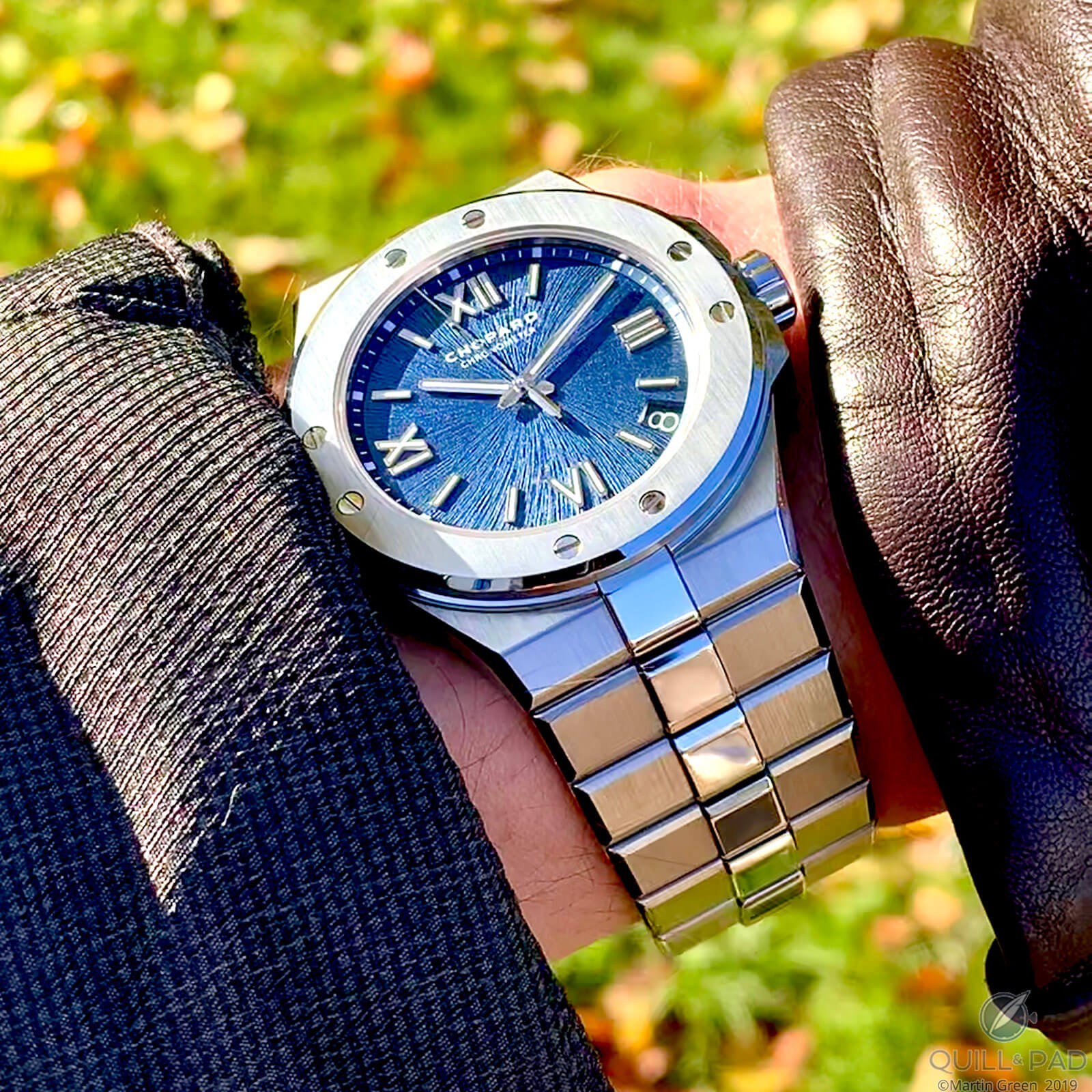
Chopard Alpine Eagle on the wrist
For many, this was also the very first thought that went through heads when Chopard recently launched its new sporty watch, the Alpine Eagle. But are these thoughts justified?
Addressing the elephant in the room
Being a blue-dialed, stainless steel sporty watch from an haute horlogerie brand means that there is an immediate elephant in the room of gargantuan proportions.
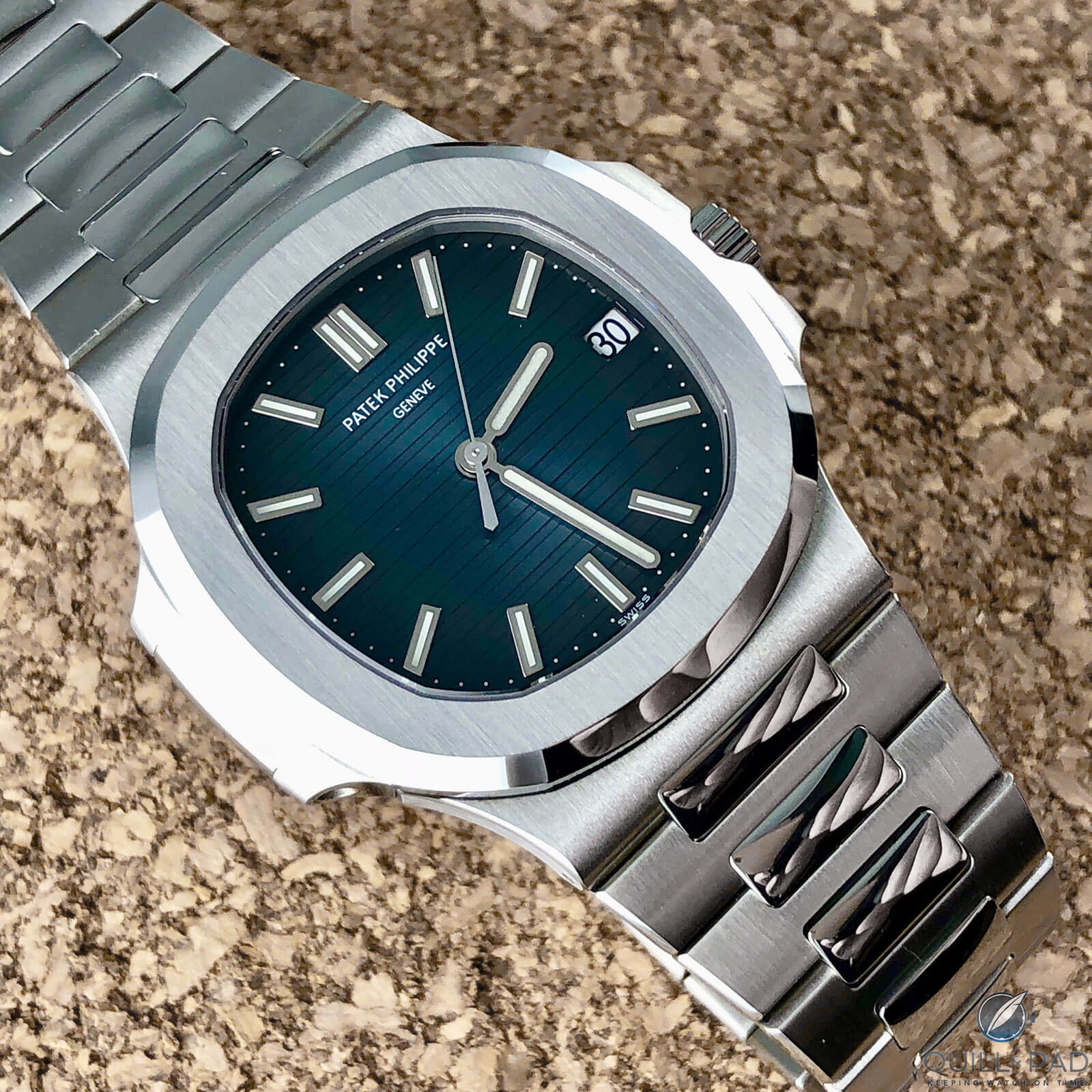
Patek Philippe Reference 5711-1A Nautilus (photo courtesy Tim Mosso)
Only so many watches within this category can escape from under the shadow that is cast by the Gérald Genta-designed Audemars Piguet Royal Oak and Patek Philippe Nautilus.
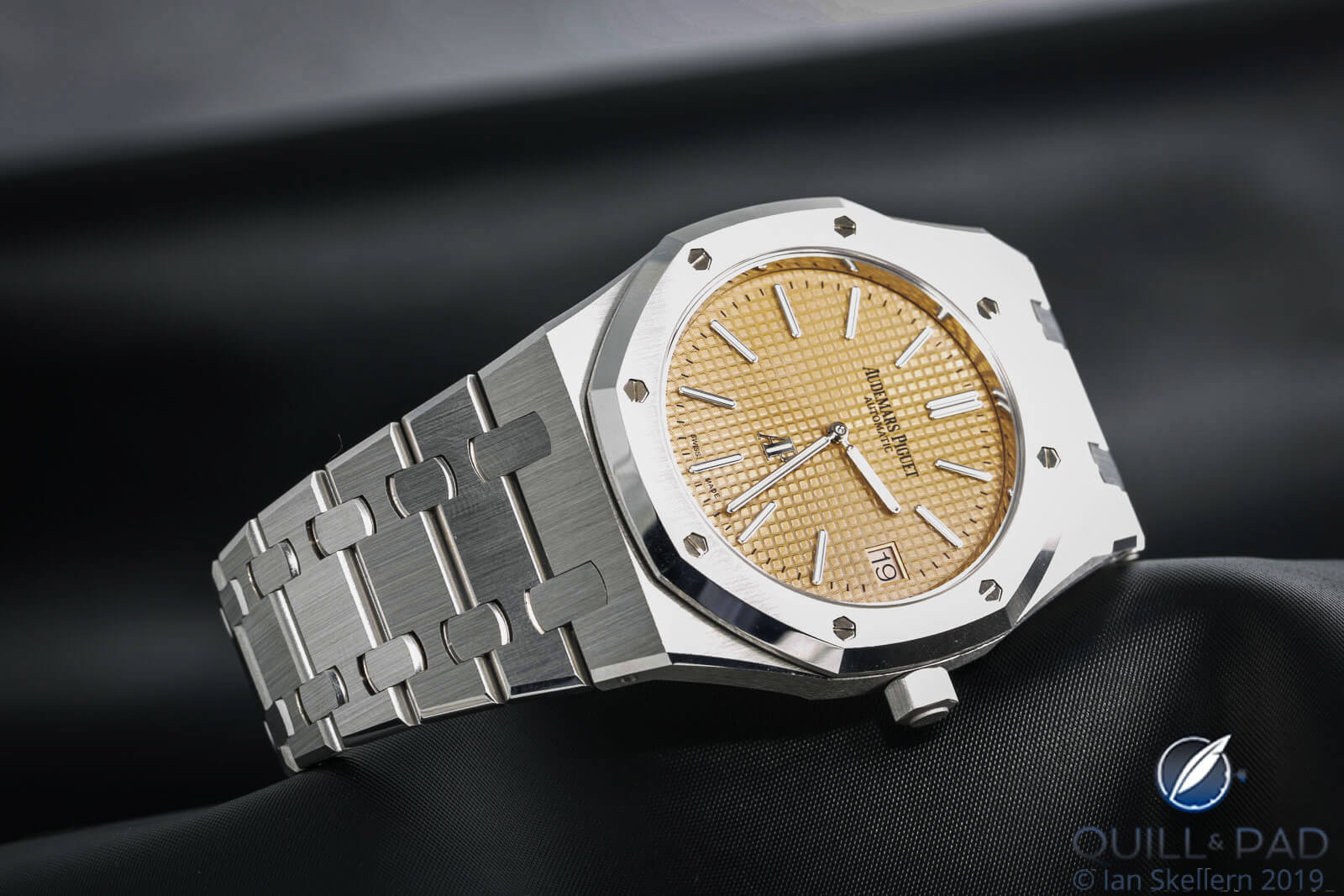
Audemars Piguet Royal Oak Jumbo Extra-Thin of 2019
These two timepieces form the benchmark that all others in the category are compared to, and even the new A. Lange & Söhne Odysseus was unable to escape the fate of first-impression casualty.
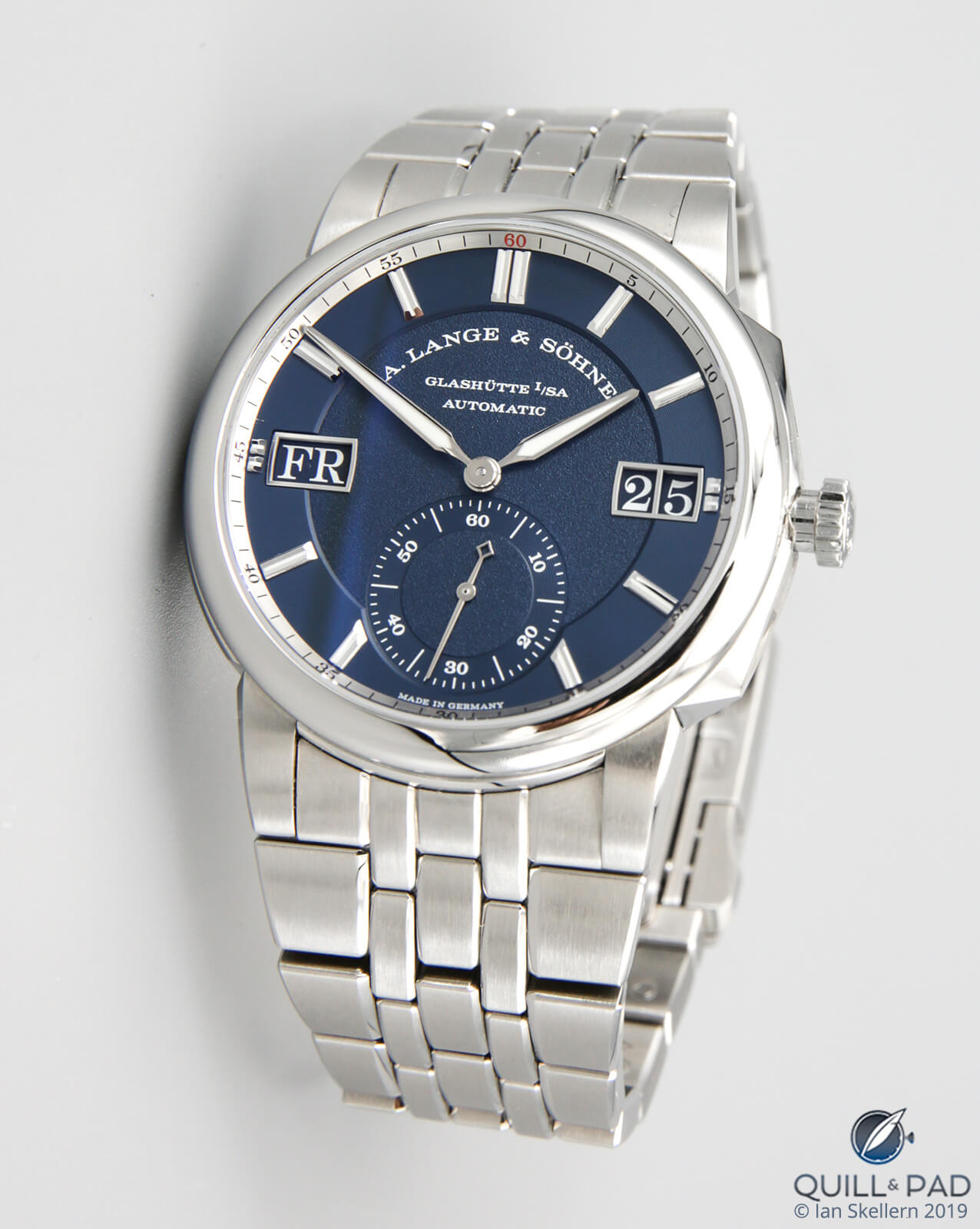
A. Lange & Söhne Odysseus
In all honesty, the Alpine Eagle doesn’t make it easy for itself with eight screws to secure the bezel and balancing the crown guard on the right by adding some extra metal on the left side. Especially in combination with an integrated bracelet and a blue dial, the brand is almost asking for comparison.
Although not as old as the Royal Oak (1972) and the Nautilus (1976), there is some interesting history to the Alpine Eagle: its design is an evolution of another watch that was designed in 1980 by Karl-Friederich Scheufele, now co-president of Chopard. But back then, he had just joined the family business at the age of 22.
Called St. Moritz, Scheufele’s creation was a sporty stainless steel watch created to appeal to Chopard’s high-class clientele wishing to engage in more casual or sportive events. The St. Moritz took on this role with ease and was so successful that Chopard even launched a slightly revamped, more modern-looking version of the original before eventually phasing it out.

Three generations of the Chopard-owning Scheufele family
In an interesting turn of events, the old St. Moritz was spotted by Karl-Friederich’s son, Karl-Fritz Scheufele, who thought that the time had come to relaunch the St. Moritz. He updated the design, and Chopard recently relaunched it as the Alpine Eagle.
This name change is not entirely the choice of Chopard as it happens that the Swatch Group now owns the right to name watches after this luxurious mountain resort town, stipulated in an agreement with the snowy Swiss community.
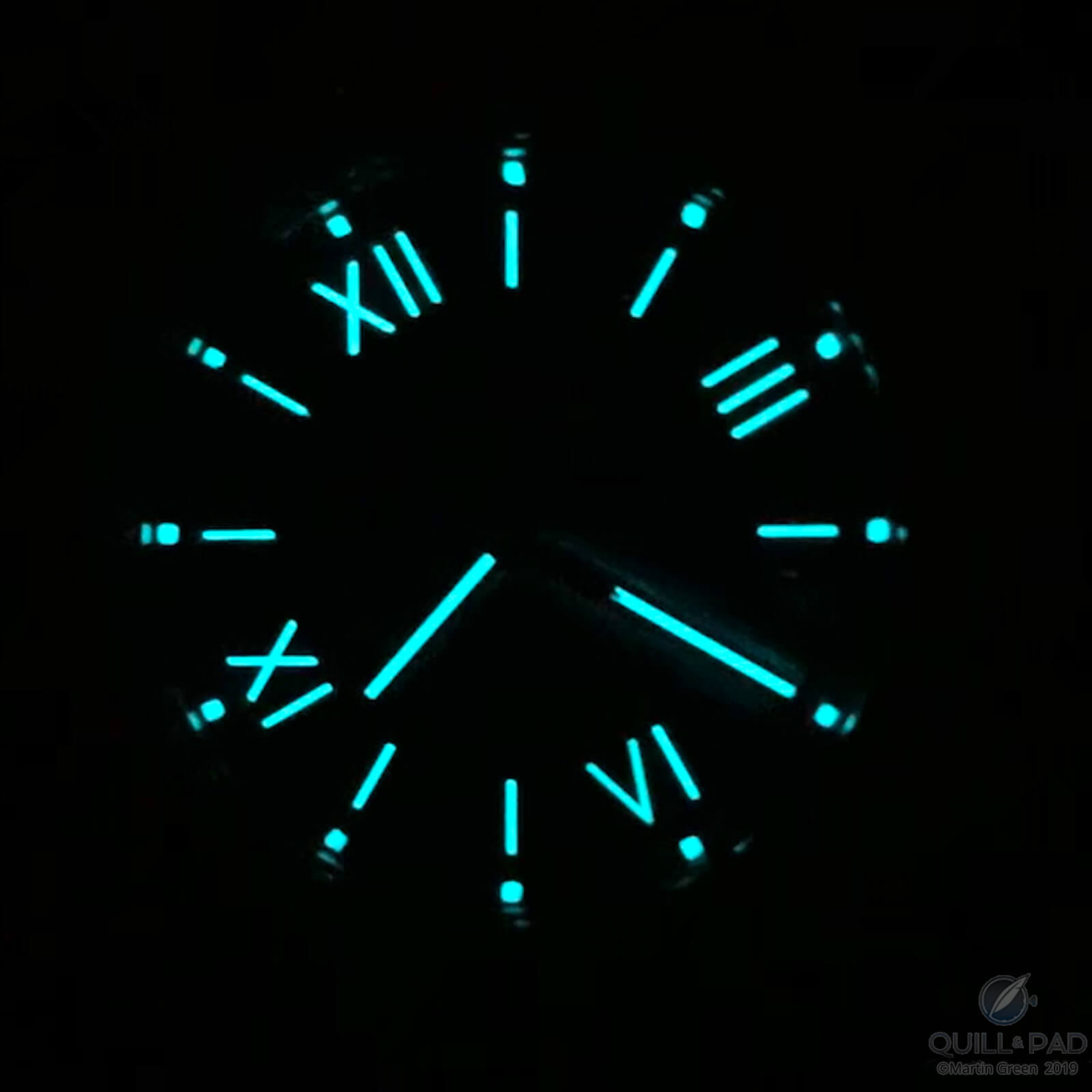
The Chopard Alpine Eagle shows off its lume
“Alpine Eagle”: what’s in a name when it’s a watch?
Having had the good fortune to wear this new watch for a week, I spent very little time mourning the name change as the Alpine Eagle is a seriously good-looking watch.
I contribute its looks to two major factors: for one, the dial. Chopard is gifted when it comes to creating dials, but the brand has outdone itself with this one. The blue is just the right hue: vibrant yet deep with a velvety lusciousness to it. There is also a lot of play of light, which gives it even more character. It might be the best blue dial that I have seen in recent years.
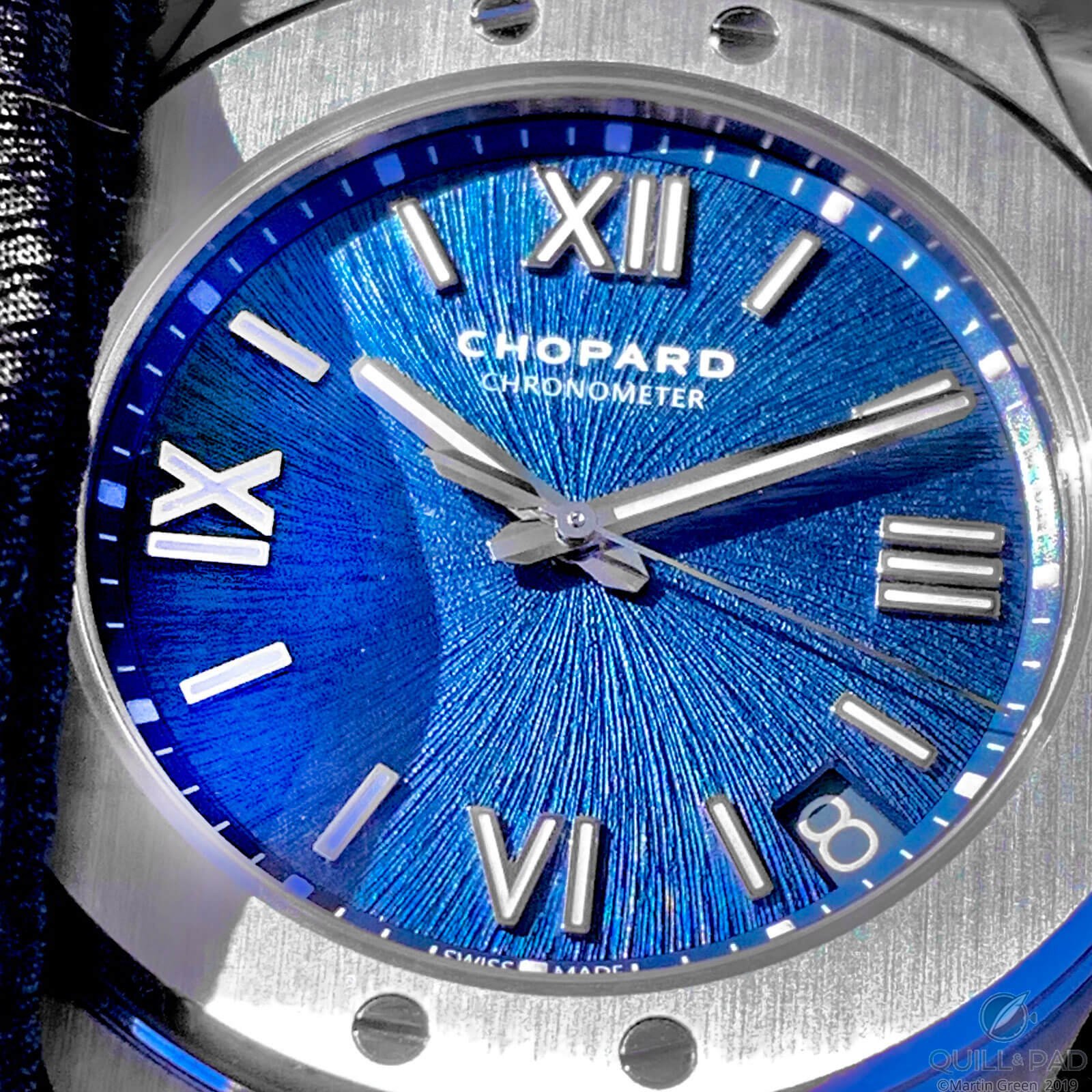
A close-up look at the textured blue dial of the Chopard Alpine Eagle
The other aspect that makes this watch stand out is the steel of which its case and bracelet are made. Chopard, which has its own forge for gold alloys, named it Lucent Steel A223.
It took four years to develop in conjunction with an Austrian producer, and it is as ethically produced as possible, with 70 percent of the material being recycled, much in the mindset of the Fairmined gold. This is quite an accomplishment as well as a substantial commitment.
While this new type of steel is non-allergenic like surgical steel, it does come with two additional advantages. First, it is 50 percent harder than many other steels, which is a good thing when you are making a high-end sports-like watch.
When wearing it I noticed it being less prone to scratching. The other advantage is the way it looks and reflects light when finished. Chopard calls this “ethereal incandescence,” and how right that description is!
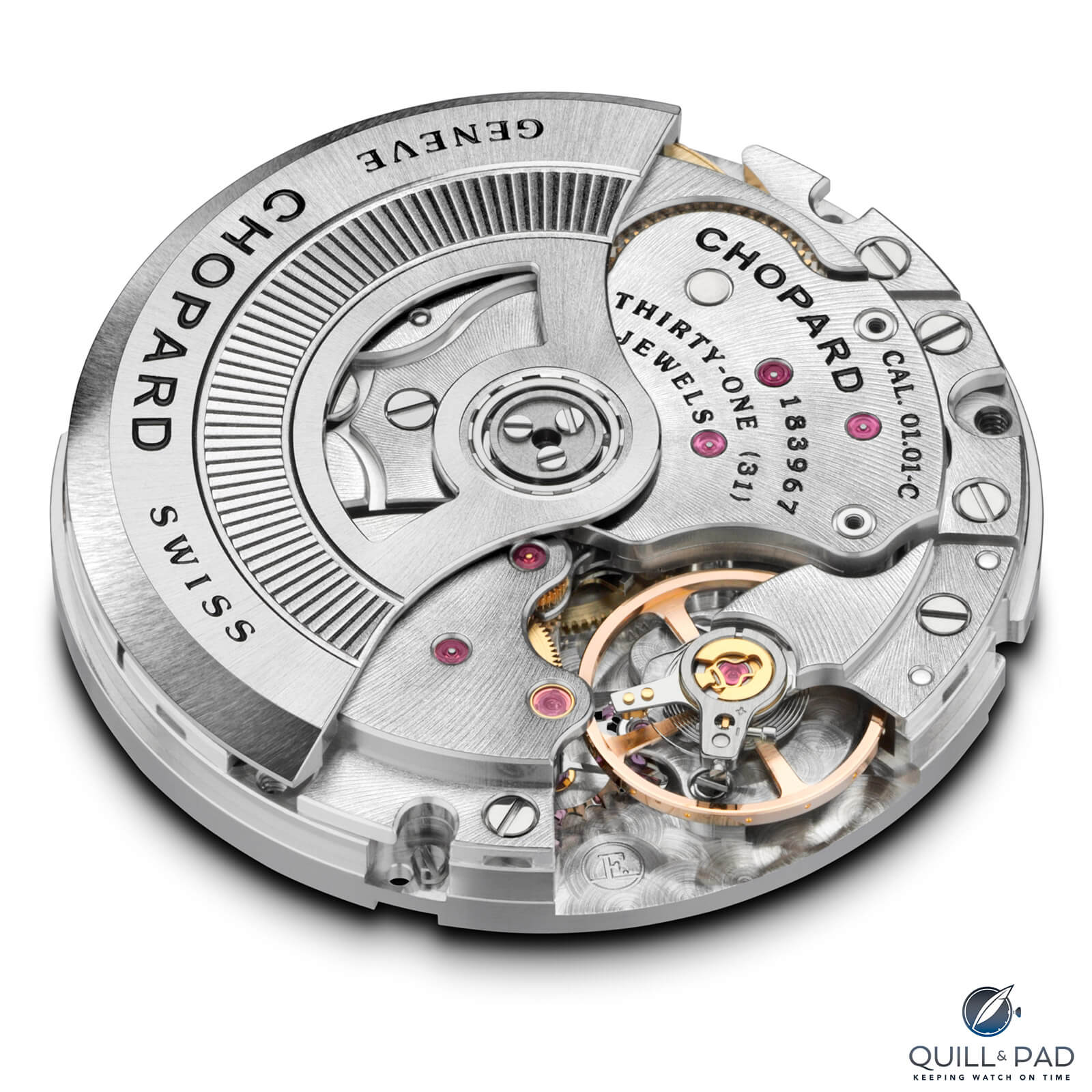
Chopard Caliber 01.01-C
Is it all about the bracelet?
The Alpine Eagle comes with an integrated bracelet that looks stunning. Each link is crafted to perfection, and here you can truly see how different Lucent Steel A223 is from other types of steel.
It reflects light in an array of colors that, in a way, complements the dial perfectly. However, to me the bracelet is also the part of the watch that still seems to be stuck in the 1980s: there is no micro adjustment on the buckle and there are only full links.
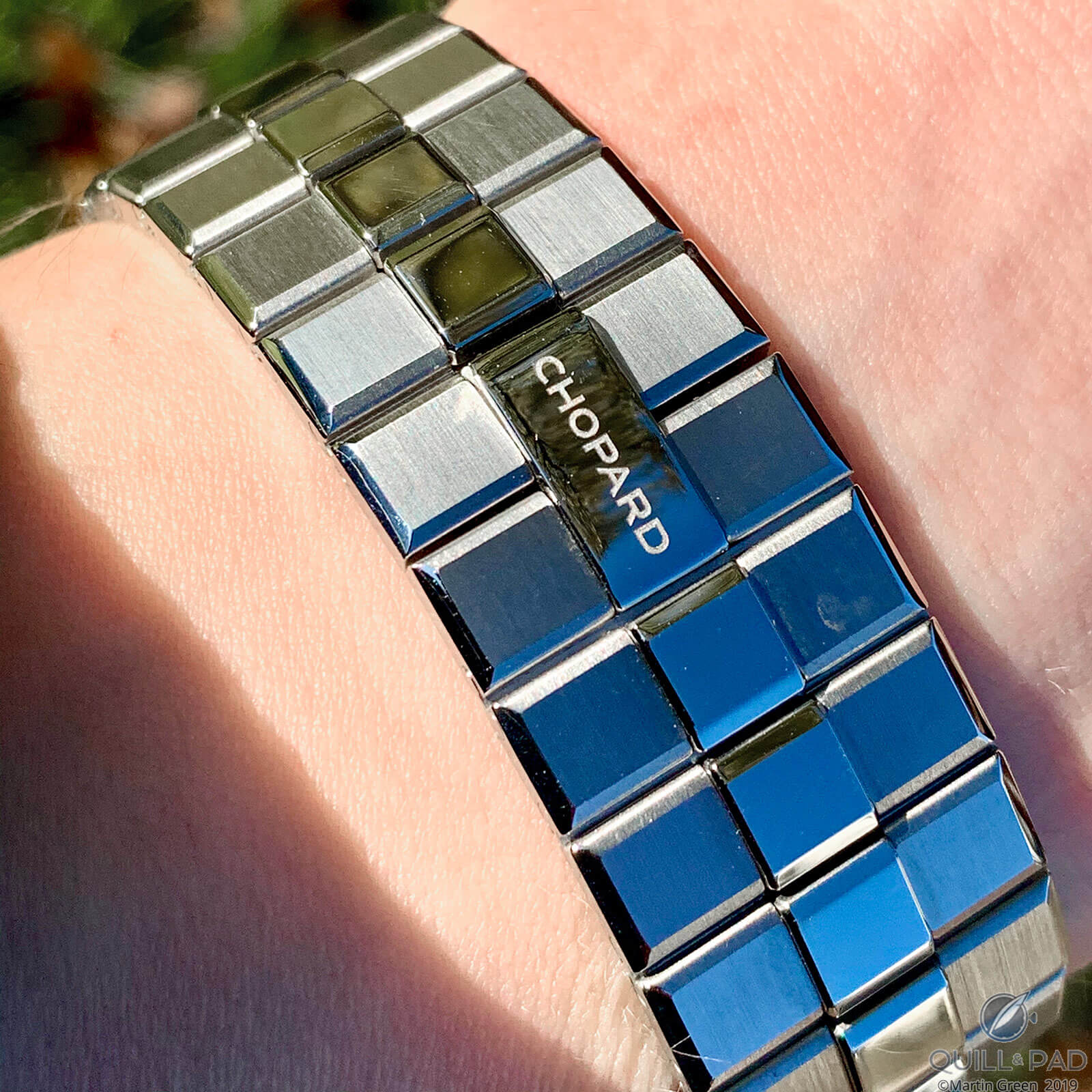
Lucent steel bracelet of the Chopard Alpine Eagle
This means that the Alpine Eagle either fits you like a glove or will always be a tiny bit off as it is too wide or too snug on the wrist. A pity in my opinion.
The clasp also requires some force to open as it doesn’t have a release system with pushers. The benefit is that it will probably never open by itself, but from a luxury sports watch in 2019 I would expect more.
How does the Alpine Eagle fare against the competition?
In all honesty, I seriously doubt if people who are in the market for a Patek Philippe Nautilus or an Audemars Piguet Royal Oak will even consider anything else. For people who are looking for something different, though, the Alpine Eagle might be right up their alleys.
While the Alpine Eagle doesn’t come cheap, its price is justified. In part because of its chronometer-certified manufacture movement, but more so because of its amazing dial and ethically produced Lucent Steel A223.
I never thought that I would say it, but this type of steel makes a difference, which is hard to capture in text and best seen in real life.
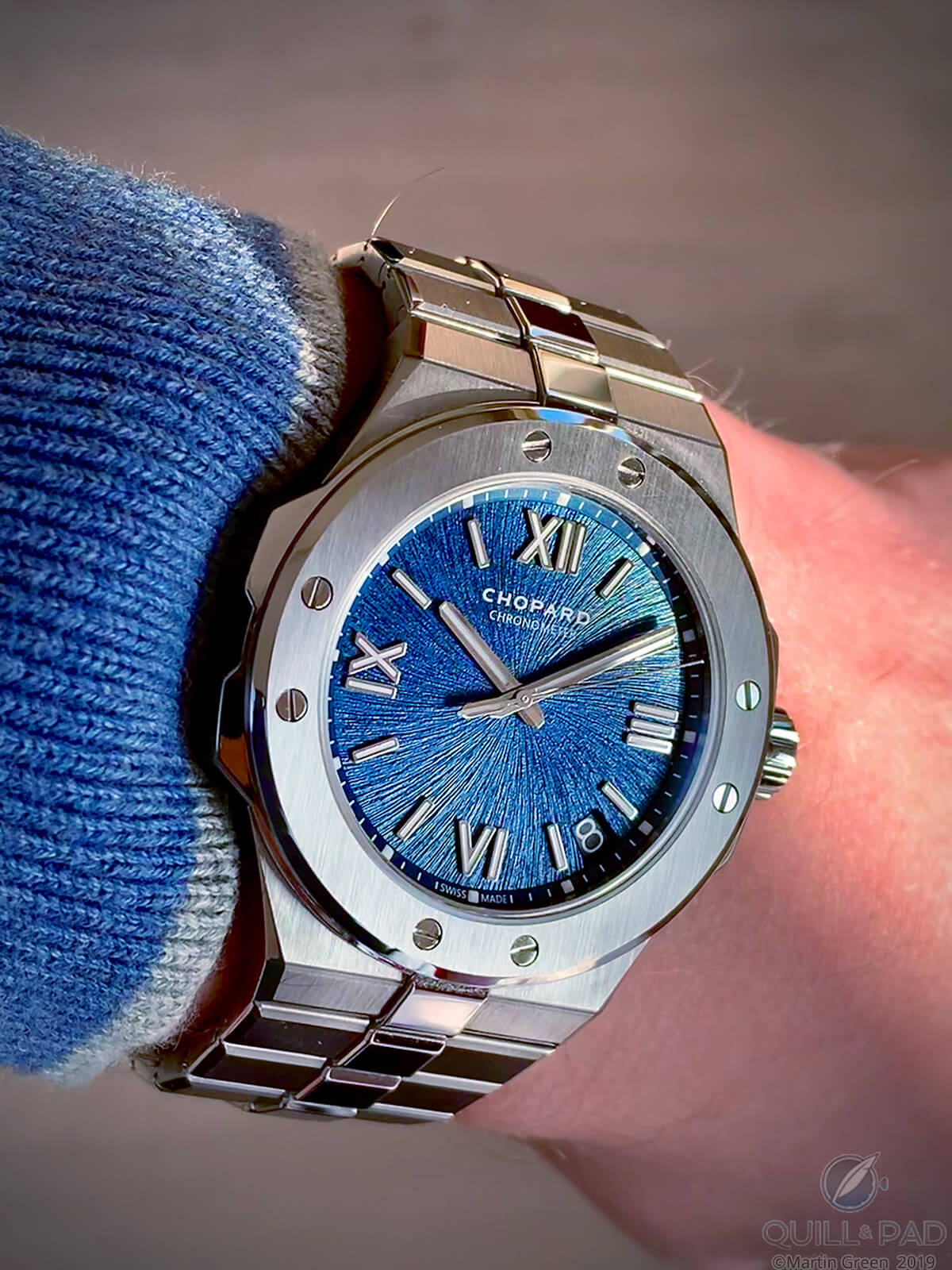
Chopard Alpine Eagle on the wrist
What I also enjoy about the Alpine Eagle is that next to the 41 mm version, the brand also launched it in 36 mm. Smart as this manufacturer’s marketers are, they resisted the temptation to brand it as a ladies model, preferring to let clients make up their own minds about who might wear it.
While the 41 mm version was very comfortable on the wrist, I would personally prefer the 36 mm Alpine Eagle because to me it puts the watch better in perspective, allowing the face of the watch to share the stage with the bracelet.
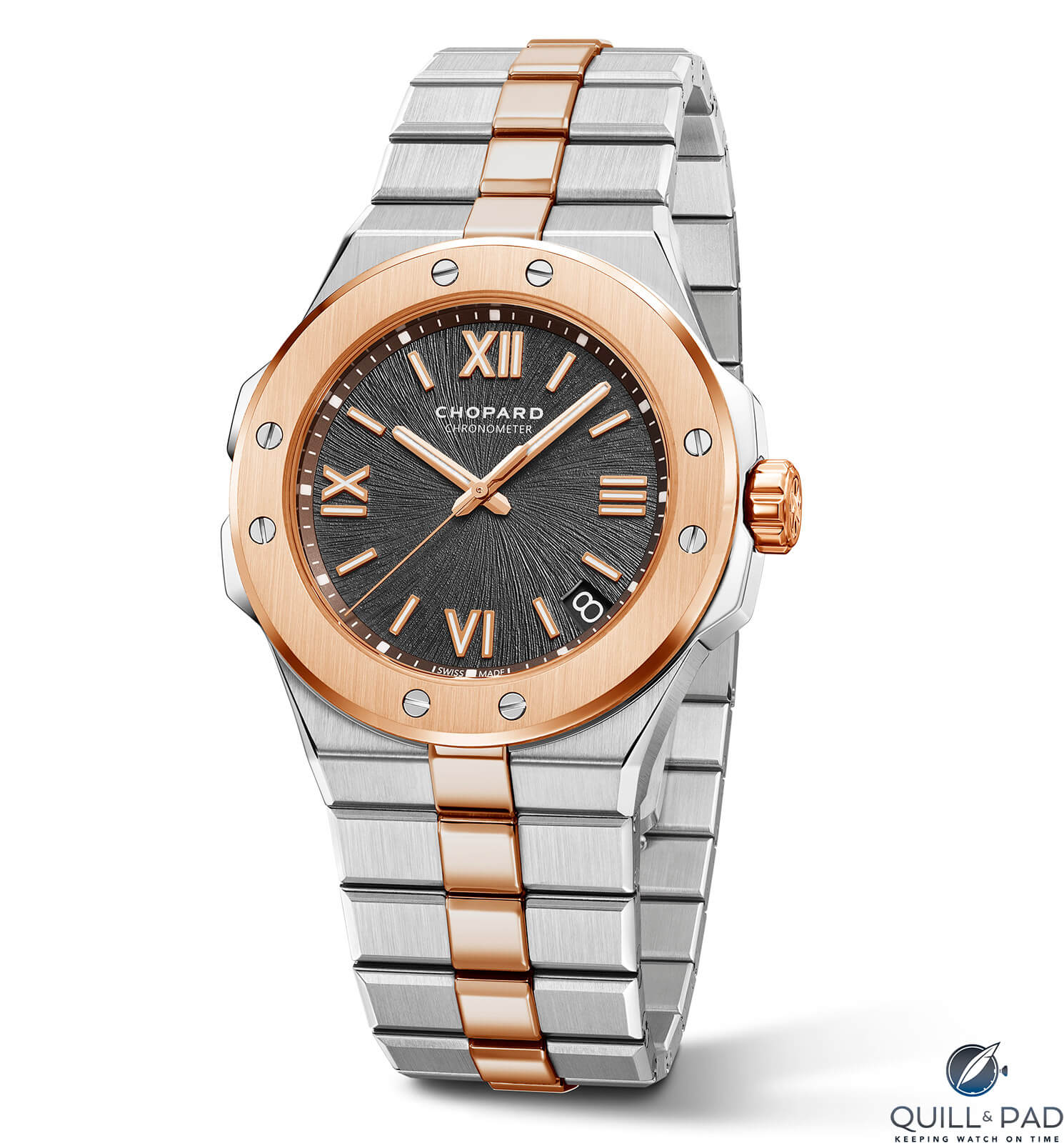
Chopard Alpine Eagle in two-tone metals
And while stainless steel might be the name of the game these days, I would actually go for the steel-gold two-tone version (CHF 19,100), not only in part as a tribute to the original St. Moritz model but also because it perfectly reflects the dynamic of being a luxurious sports watch.
Perhaps that should become the next hype?
For more information, please visit www.chopard.com/intl/alpine-eagle.
Quick Facts Chopard Alpine Eagle
Case: Lucent Steel A223, 41 x 9.7 mm
Movement: automatic Caliber Chopard 01.01-C; 60-hour power reserve; 4 Hz/28,800 vph frequency, officially C.O.S.C. chronometer certified
Functions: hours, minutes, seconds; date
Price: CHF 12,450
You may also enjoy:
Stainless Steel Patek Philippe Nautilus Market Madness: Thoughts On The Current Market Situation
Watch Design: Originality, Similarity, Or Imitation?
Bell & Ross BR 05 For A Week On The Wrist: How It Measures Up
Leave a Reply
Want to join the discussion?Feel free to contribute!



The steel “was developed in house” and is “ethically produced”. This needs some explanation, no?
1. You don’t just develop steel alloys “in house”; is that really what Chopard are claiming? It is a large-scale industrial process. Are you suggesting Chopard is MAKING STAINLESS STEEL ITSELF now? Even Rolex doesn’t do that.
2. Fairmined gold is about an ethical mining process – the treatment, pay and rights of workers. There is nothing equivalent to address here. Stainless steel is a recycled material, so what is Chopard doing that makes this material “ethical”? Have you asked them? Or are you just dropping press release factoids into your review, untested or researched?
Thank you for your comments, TJ. As you can see, Martin dug deeper and got interesting answers. I have updated the story to reflect the new information.
Dear TJ,
First of all, thank you for your comments. Chopard has just confirmed that there has been a slight error in some of the information that was provided about the steel of the new Alpine Eagle. As it turns out it was developed in collaboration with the Austrian metal producer Voustalpine, and the Lucent steel’s composition is 70% recycled stainless steel. As Chopard is greatly committed to becoming a more ethically responsible and sustainable producer of luxury goods, with a foundry of their own, the facts presented to us were at the time of writing perfectly plausible. Yet thanks to your comments we were able to set the record straight.